| While the headline is on the sensational side, this is an interesting article on changing dynamics in feedlot management over time, and the need for understanding chronic oxidative stress.
Join the Club, Buddy; Research Shows Feedlot Cattle Stressed Out, Running On Empty, Too 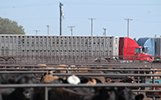
Wes Ishmael, Beef Magazine | February 8, 2018
VeriPrime Research collaborated with Colorado State University (CSU) to conduct a mobility assessment of cattle going to slaughter that had been treated with the chelated trace mineral formulation. The CSU group scored the mobility of cattle at the feedlot, just before shipping to the packinghouse, and upon arrival at the packinghouse.
Researchers scored mobility using the mobility scoring system for finished cattle adapted by the North American Meat Institute (NAMI) for approximately 1,600 head of cattle at the two identified time points. In this scoring system, 1 equals normal mobility and 4 means cattle are extremely reluctant to move.
"Prior to shipping, 98.7% of the cattle were normal and walking easily [category 1], and no category 3s or 4s were identified," says Lily Edwards–Callaway, a CSU assistant professor.
For broader perspective, Edwards–Callaway and fellow researchers recently published Mobility Scoring of Finished Cattle. In it they describe the Elanco Animal Health Full Value Beef Cattle Mobility Assessment Program (BCMAP), which uses the aforementioned NAMI scoring system.
Despite Naysayers, Some Follow Savory Path to Holistic Farming 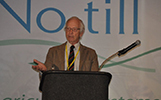
Jenn Sharp, Saskatoon Star Phoenix | February 12, 2018
Savory has long promoted the principle of sustainability, going back to his early days as a game ranger, farmer and biologist. Today, he is an international consultant, touting his holistic management concept around the globe through the Savory Institute, which follows Savory's deep–rooted mission: to restore the land to health using livestock as the primary tool. "Today, most farmers are facing real severe problems while corporate agriculture and stock markets thrive artificially," Savory said.
For years, people have been told it was livestock, coal and oil that were the culprits of climate change, he said.
However, he added, "We were once just as certain that the world was flat. We were wrong then, and we are wrong again."
The Three Things to Address to Achieve Beef Success 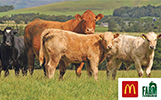
Farmers Guardian | February 9, 2018
For McDonald's, beef is an iconic product, and Peter Garbutt, agriculture manager for McDonald's says customers care where the product comes from, how it was farmed and who produced it.
He says: "By working with farmers to find out what sustainability means to their businesses, it not only helps them improve on areas they need to work on, but it also means we have a message about the work beef farmers are undertaking, which we can then communicate to our customers."
As part of this message, McDonald's aims to source a portion of its beef cattle by 2020 to principles recognised by the Global Roundtable for Sustainable Beef. Mr Garbutt says McDonald's is keen to help its farmers in the UK and Ireland achieve this goal, and to do so it is working with organisations such as the Sustainable Agriculture Initiative Platform to find solutions to sustainability challenges in the beef supply chain. This follows initiatives including the McDonald's sustainable beef clubs, where carbon footprinting and discussion groups were used over six years to help farms reduce their emissions, improve animal health and invest to increase productivity.
Rabobank Advises Beef Industry to Get Online
Susan Kelly, meatingplace | February 9, 2018
To stem any further decline in consumption, the beef industry must embrace the switch to online shopping that is shaking up the grocery business, Rabobank said in a new research report. Calling it the biggest transition to occur in grocery shopping since the introduction of the supermarket in the 1930s, Rabobank said the online market offers a consumer pool larger than any conventional store or chain. It also provides opportunities to boost beef sales, particularly via meal kits.
Cargill Invests in Cow Facial Recognition Technology 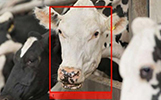
Sara Brown, Drovers | February 9, 2018
"It's important for us to invest in emerging digital technologies that drive value for our customers and for the industry," said Scott Ainslie, vice president and group director, Cargill Animal Nutrition. Cargill has taken a minority stake in Cainthus, an Irish startup that uses facial recognition software to increase the productivity of dairy and beef cows.
Co–Founder David Hunt, says Cainthus uses machine–learning and imaging technologies to identify cows and glean animal information, such as behavior and feed consumption, says a recent Bloomberg article. The technology uses digital cameras for the software and monitors activity without wearable devices.
"We are enthused about what this partnership will mean for farmers across the world," said David Hunt, president and co–founder, Cainthus. "Cargill is a natural partner for us, given their focus on bringing a world–class digital capability to the market and their understanding of how technology will truly help farmers succeed. We think this partnership will be a game changer for farmers because it will allow them to efficiently scale their business."
If the figures in this article are correct, New Zealanders are changing their dietary preferences quite rapidly, but read Sam McIvor of Beef and Lamb New Zealand's note here here for a closer insight.
Government Warning: Farmers Ignore Concerns About Meat at Their Peril 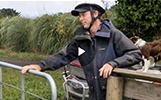
Madison Reidy, Food & Wine | February 11, 2018
Besieged by celebrity vegetarians, our agriculture industry is taking up the challenge of finding alternatives to old–style farmed meat. Deep in the Rangitikei, Richard Morrison and his livestock seem safely tucked away from threats. But he, like all meat farmers, is being confronted by a laboratory–grown blight that he cannot fence out.
Bullish new companies are putting meat mimic products on supermarket shelves, challenging one of New Zealand's most valuable export industries and forcing farmers to rethink their future. The options are popularising a consumer movement away from slaughtered food, causing demand for beef and lamb to drop.
Owners of 150–year–old family farms like Morrison's are shaking in their gumboots, hoping the world's red–meat cravings will continue. Watch 1:51 Video HERE. | |
